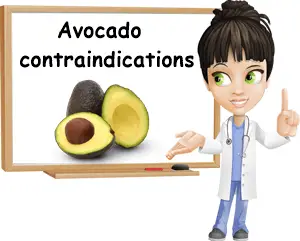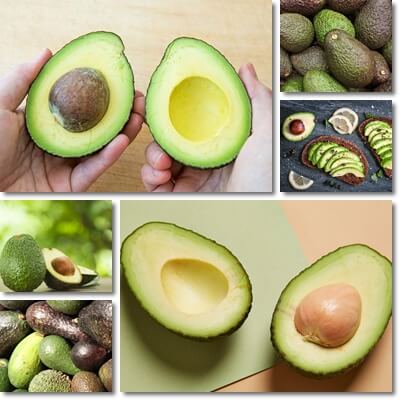It’s a well known fact that eating avocado is good for you for a number of reasons, starting with its benefits for cardiovascular health and ending with its potential for expressing anticancer properties.
At the same time, eating avocado also comes with side effects for some people, more or less serious depending on the person and their individual sensitivities and nutritional requirements.
Avocado side effects range from digestive discomfort to weight gain and allergic reactions. If anyone experiences any adverse effects after eating the fruit, then these effects should be regarded as contraindications of the fruit and consumption discontinued for health concerns.
Personally, I enjoy eating a couple of avocados a week, although not continuously and have only experienced benefits from the fruit, including feeling satiated for longer and energized but without feeling full.
I could even eat one or two avocados a week when I was dealing with gastritis and had to follow a strict diet plan and my recovery was in no way affected by this dietary choice.

At the same time, there are so many people out there who have experienced mild to severe side effects after eating avocado, even in moderate amounts.
Because when it comes to food, even with healthy options you can expect to experience both benefits and side effects; we are all different and react differently to various foods, so health effects may vary widely from person to person.
With this in mind, if you have every felt sick after eating avocado, know there is a reason for this and you should not force yourself to eat the fruit any longer, no matter what others advise you or how good they say it is for them.
How is avocado bad for you?
1) Weight gain. This is actually one of the most likely side effect of the fruit. Unless you have a fast metabolism or are so active that you burn through what you eat before it would be time for your next meal, then eating avocado every day or every other day might not be that good for you. Raw avocado contains 160 kcal/100 g, meaning that 1 avocado fruit without skin and seed weighing 136 g has 227 kcal. Some fruit are bigger and will have even more calories which can make it difficult to manage your weight if you measure your intake in other than grams (if, for example, you eat half an avocado, not the recommended serving of 30 g a day).
What causes avocado to be fattening is its relatively high energetic value as a result of a high fat content. On average, 100 of avocado contains 15 g of fat. And when it comes to weight management, it doesn’t matter what kind of fat it is that avocados contain. Eating too much will cause you to gain weight. If you like the fruit so much and want to include it in your diet almost every day, then it’s important to keep to the recommended serving of 30 g of avocado a day and, in case you eat more, balance your intake of other foods with a high energetic value.

2) Acid reflux. One of the biggest side effects of eating too much avocado is acid reflux. Because it is a generous source of fat (15 g of fat/100 g), albeit vegetal fat, avocado can be too rich to digest in larger than recommended amounts. And what happens when you eat foods high in fats? You get acid reflux. It’s possible eating avocado may be bad for you and you might not even know it when the acid reflux is silent. Another thing that can contribute to avocado acid reflux is the relatively high dietary fiber content, 100 g of avocado containing 6.8 g of dietary fiber. Too much fiber can work up the stomach and easily lead to gastroesophageal reflux, especially in those more sensitive to a high fiber intake.
See other foods to eat and to avoid for acid reflux.
3) Nausea and vomiting. So many people experience nausea and vomiting after eating avocado, whether it’s half a fruit or less, every other day or infrequently. Nausea after eating avocado can be a sign of an intolerance to the fruit. If it’s recurrent, then it might be best to discontinue consumption, at least until you see a doctor and manage to find out the exact reason why you feel sick after eating avocado. Nausea and vomiting can both be caused by the rich fat content of the fruit which might just not agree with your stomach.
It’s also possible to feel sick after eating avocado a few times, but not all the time. If this is the case, you could be having a reaction to certain fruits from certain sources only. You could just be starting to develop an intolerance to the fruit. Or it could be that maybe some fruit were not ripe enough when you ate them and your stomach reacted to this. If nausea is strong and vomiting occurs soon after, consider it may be a sign of an allergic reaction and seek medical help as soon as possible.
4) Gastritis. Like I mentioned above, for me avocado is a good food to eat. While I’ve eaten small amounts infrequently during my recovery from gastritis and even included the fruit in my 1 Week Gastritis Diet Plan, it is not uncommon to experience stomach upset after eating avocado. And for those with an existing gastritis, the fruit can sometimes worsen symptoms and set you back on your recovery. This side effect has been attributed to the fruit’s high fat content, high fiber content or other compounds that may act as irritants for the stomach.
Read more about what foods to eat and to avoid for gastritis.
5) Diarrhea. Avocados are known to help with constipation because they provide good amounts of dietary fiber (an estimated of 6.8 g of fiber/100 g) as well as plenty of fats to help smooth things along (15 g of fat/100 g on average). At the same time, eating too much avocado can cause abdominal cramps and loose stools. You can experience diarrhea after eating too much avocado at once or after eating small amounts of the fruit over the course of a few days. In rare cases, diarrhea from avocado can be a sign of an allergic reaction to compounds in the fruit.
6) Intolerance or hypersensitivity. Some people may experience an intolerance or hypersensitivity to the fruit which can manifest through symptoms such as loose stools or diarrhea, rashes, lightheadedness, brain fog, nausea and vomiting. Symptoms may occur shortly after eating avocado or even after a few days. Because there is a risk of allergic reaction, it is important to seek medical attention.
7) Allergic reaction. Allergic reactions to avocado are possible, although relatively rare. Symptoms may appear shortly after eating the fruit or a dish containing it or up to two days after. There are actually two types of avocado allergy. One is an allergic reaction restricted to the mouth and includes throat tingling or mild itchiness, itchy tongue, tongue and throat swelling. Another is a generalized allergic reaction that produces symptoms such as hives or urticaria (itchy, red or white, itchy bumps on skin), tingling throat, swelling of the tongue, throat swelling, nausea, vomiting, stomach cramps, low blood pressure, difficulty breathing. Both types of avocado allergy can progress to anaphylactic shock. If you experience any of these symptoms, seek medical attention right away.
8) Medicine interactions and blood clots. 100 g of avocado contains 21 mcg (micrograms) of vitamin K, out of the 120 mcg recommended daily intake for an average adult. And considering 1 whole avocado provides 30% to 50% more vitamin K, regular consumption could be bad for anyone with a risk for blood clots. Vitamin K is known to support normal blood coagulation, but a too high a intake can lead to blood clots in predisposed individuals. Because of their good vitamin K content, avocados can interact with medication such as warfarin and reduce its effectiveness.
See also :How Long Does Avocado Last?
Avocado and pregnancy
While the fruit is considered safe for consumption for the most part, it is generally not recommended to eat avocado during pregnancy or when nursing for fear of various side effects. At least not in excessive amounts. Allergy and blood coagulation problems are some of the main concerns. At the same time, some doctors consider that, aside from known problematic foods, pregnant women should maintain roughly the same diet as before the pregnancy, only stressing moderation and variety. So if you’ve eaten avocado regularly, you can continue to do so during pregnancy as well.
